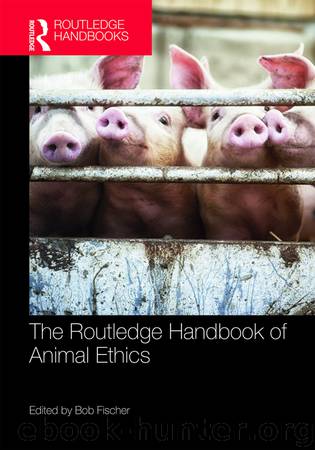The Routledge Handbook of Animal Ethics by Bob Fischer;

Author:Bob Fischer;
Language: eng
Format: epub
Publisher: Taylor & Francis (CAM)
Published: 2019-11-30T16:00:00+00:00
Ethical Dilemmas
While the domestic ethic of kindness insisted that animals were entitled to gentle treatment, it was less clear what “kindness” meant outside the household, in the context of a society wholly dependent on animals for power, raw materials, and food. Even city folk had contact in the streets with animals living their lives completely outside the domestic spaces that were intended to perform the ideal of kindness in daily life. (Early humane efforts on behalf of working horses were sometimes mocked as domestic sentiments inappropriate to the rough world of men’s work.) Furthermore, tensions in the ethic in relation to pet keeping became especially apparent in the context of two household dilemmas—the status of the livestock pet and the circumstances surrounding euthanizing.
Often, town-dwelling and suburban families that kept pets also kept livestock: a small flock of chickens, a family cow or pig, and perhaps a horse. These seem to have been the families where livestock pets appeared, although there is evidence of farm children having pet calves and poultry. In the case of chickens, children might have one or two as named pets, exempt from slaughter because of their special identity, while the rest of the flock was available for both meat and eggs. The fate of calves and pigs, often named but inevitably doomed, was sometimes the source of emotional trauma for sensitive children. It’s rarely clear how conversations about these boundaries took place, but children may have imbibed the lesson simply by observing the routines of care and consumption. The domestic ethic of kindness insisted that such animals were entitled to kind treatment while in the family’s direct care, but it never challenged the idea that their meat was necessary for the human family itself to thrive (Grier 2006).
The debate around euthanizing cats and dogs also reveals the ways that practical realities shaped ideas about kindness. Pet owners often faced the dilemma of animal suffering, and the domestic ethic of kindness asked that they take responsibility for either ameliorating or ending it. The primitive nature of medical care (for both animals and people) meant that most pets died from infectious diseases now prevented by vaccines or from injuries that they would now recover from thanks to modern veterinary medicine. Controlling the numbers of some species was also a problem. Cats bred freely, leaving owners to cope with multiple litters; the fertility of female dogs was controlled to some extent by shutting them away from suitors. The domestic ethic’s concept of stewardship taught that abandonment of a dependent was cruel. Thus, conscientious owners were left to face the task of euthanizing but without the support of veterinary medicine, which largely neglected small animals until the 1920s. Praise for owners who offered an animal a good death, and even instructions on the proper methods appeared in some surprising places, including children’s literature. For example, Harriet Beecher Stowe published one children’s story explicitly supporting the common practice of drowning unwanted kittens as a kindness. A paperback edition of Anna Sewell’s
Download
This site does not store any files on its server. We only index and link to content provided by other sites. Please contact the content providers to delete copyright contents if any and email us, we'll remove relevant links or contents immediately.
The Lonely City by Olivia Laing(4565)
Animal Frequency by Melissa Alvarez(4147)
All Creatures Great and Small by James Herriot(3980)
Walking by Henry David Thoreau(3681)
Exit West by Mohsin Hamid(3632)
Origin Story: A Big History of Everything by David Christian(3470)
COSMOS by Carl Sagan(3346)
How to Read Water: Clues and Patterns from Puddles to the Sea (Natural Navigation) by Tristan Gooley(3236)
How to Do Nothing by Jenny Odell(3099)
The Inner Life of Animals by Peter Wohlleben(3097)
Hedgerow by John Wright(3095)
How to Read Nature by Tristan Gooley(3073)
Project Animal Farm: An Accidental Journey into the Secret World of Farming and the Truth About Our Food by Sonia Faruqi(3008)
Origin Story by David Christian(2990)
Water by Ian Miller(2950)
A Forest Journey by John Perlin(2909)
The Plant Messiah by Carlos Magdalena(2745)
A Wilder Time by William E. Glassley(2686)
Forests: A Very Short Introduction by Jaboury Ghazoul(2668)
